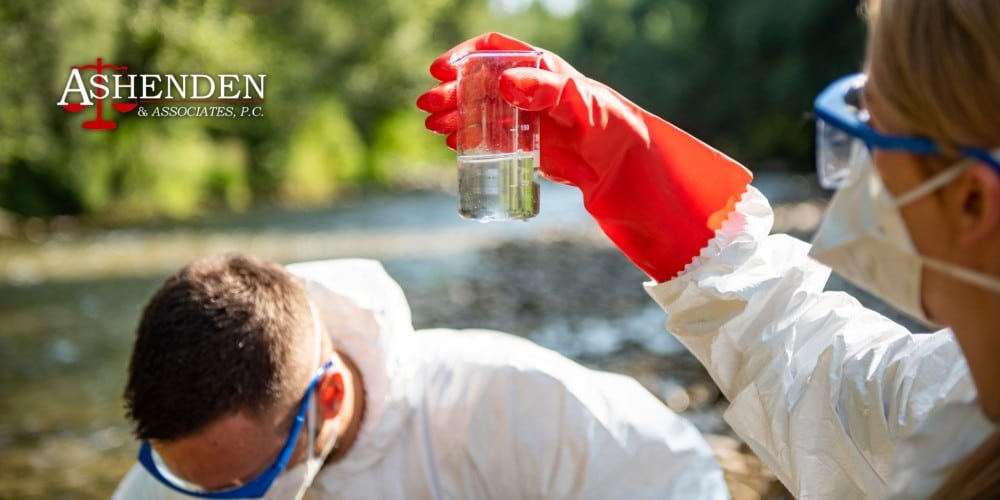We Go The Extra Distance For Our Clients
Home » PFAS Lawsuit
Practice Areas
Atlanta and Sandy Springs PFAS Lawsuit Attorneys
If you’re experiencing health problems linked to PFAS contamination, you may be eligible to file a PFAS lawsuit and pursue compensation. At Ashenden & Associates, we represent individuals in Atlanta and Sandy Springs, GA, who have suffered serious health issues after being exposed to PFAS chemicals in their drinking water, household products, and other everyday items.
Researchers have linked PFAS exposure to kidney cancer, thyroid disease, ulcerative colitis, high cholesterol, and other severe health conditions. If you or a loved one has developed health problems after being exposed to PFAS-contaminated water or products containing these “forever chemicals,” you may have the right to take legal action. Our team can help you seek a fair settlement and work to ensure that negligent chemical companies are held accountable for their actions.
To schedule a free consultation with an Atlanta and Sandy Springs personal injury attorney, call 770-394-8909 or contact us online today.

What Are PFAS Chemicals?
PFAS chemicals, or per- and polyfluoroalkyl substances, are a group of man-made chemical compounds used in consumer and industrial products for their resistance to heat, water, and oil. Manufacturers have been using these substances since the 1940s in products such as non-stick cookware, stain-resistant fabrics, water-repellent clothing, and food packaging, among others. Because of their widespread use, PFAS chemicals have entered water systems across the country, leading to a growing number of PFAS-related lawsuits.
Why PFAS Are Called “Forever Chemicals”
PFAS are often referred to as “forever chemicals” because they do not break down easily in the environment or the human body. These man-made chemicals are composed of strong chemical bonds, making them resistant to the natural degradation process. As a result, PFAS compounds can stay in water supplies, soil, and the human body for many years.
Common Uses of PFAS Chemicals in Consumer and Industrial Products
Per- and polyfluoroalkyl substances (PFAS) have been used for decades in a wide array of products because of their resistance to heat, water, and oil. Many everyday items, along with tools and materials used by large industries and the military, contain these chemical compounds.
Common uses of PFAS include:
- Non-stick coatings (such as Teflon cookware)
- Stain-resistant carpets and upholstery
- Water-repellent clothing and outdoor gear
- Food packaging (like fast-food wrappers and microwave popcorn bags)
- Fire extinguishers
- Industrial products used in manufacturing
- Cleaning products
- Personal care items (such as nail polish, shampoo, and floss)
- Paints, sealants, and coatings
Because so many products contain PFAS compounds, they have exposed millions of people without them even realizing it.

How PFAS Contaminate Water Supplies
PFAS chemicals contaminate water supplies when products containing them release the substances into the environment during manufacturing, use, or disposal. When water carries PFAS compounds into the ground, they seep into soil and enter groundwater or nearby rivers and lakes. Over time, they build up in water systems and contaminate drinking water supplies.
Since PFAS do not break down easily, they stay in the environment for decades and continue to spread. This has led to dangerous levels of PFAS in many water districts, affecting tens of millions of people across the country.
The Environmental Protection Agency (EPA) has recognized the risks of PFAS exposure through contaminated drinking water, and plaintiffs have filed many PFAS-related lawsuits to hold chemical companies accountable for widespread water contamination.
Additional Per- and Polyfluoroalkyl Substances (PFAS) Lawsuits Our Attorneys Handle
Because a wide range of consumer and industrial products contain PFAS chemicals, plaintiffs across the country have filed several class action lawsuits and multidistrict litigations involving PFAS contamination. These lawsuits focus on contaminated drinking water and other products containing per- and polyfluoroalkyl substances.
At Ashenden & Associates, we handle a variety of PFAS-related lawsuits for individuals who have suffered serious health problems after PFAS exposure. Below are some of the lawsuits our Atlanta and Sandy Springs product liability attorneys handle.
PFAS Contamination Lawsuits Against 3M, DuPont, and Chemours
Major PFAS contamination lawsuits have been filed against the chemical companies 3M, DuPont, and Chemours for their role in polluting water supplies with polyfluoroalkyl substances. 3M agreed to pay billions in settlements, including a $10.3 billion deal with U.S. public water systems. DuPont and Chemours also paid over $1 billion combined to resolve claims involving contaminated drinking water.
Firefighting Foam and PFAS: Legal Action Against AFFF Manufacturers
Aqueous film-forming foam (AFFF), commonly called firefighting foam, has been used for years to put out fuel fires, especially at airports, military bases, and industrial sites. Researchers recently discovered that PFAS chemicals in AFFF can increase cancer risk after long-term exposure.
You may qualify to file an AFFF lawsuit if you regularly encountered firefighting foam and later received a cancer diagnosis, such as kidney, pancreatic, prostate, or testicular cancer. This includes firefighters, military personnel, airport workers, and individuals living near sites with PFAS-contaminated water. The court has consolidated all federal AFFF lawsuits into a multidistrict litigation (MDL) in the South Carolina federal court.
Military Bases and PFAS Exposure Lawsuits
If you served in the military or live near a military base that regularly used firefighting foam or other products containing PFAS, you may be eligible for a PFAS lawsuit. These man-made chemicals can seep into the ground and contaminate nearby water supplies, including your drinking water.
Even if you were not in direct contact with firefighting foam, simply living close to a base where it was used could have exposed you to dangerous levels of PFAS over time. This kind of exposure has been linked to serious health problems, and you may have the right to take legal action if you’ve been harmed.
Band-Aid Products Containing PFAS
Adhesive bandages, including several Band-Aid products, have recently been found to contain PFAS chemicals. In a certified lab test of 40 bandage products, 65% tested positive for PFAS. This finding is especially concerning because placing bandages on open wounds may allow PFAS to enter the body through the skin.
Band-Aid is not the only affected brand; tests also found PFAS in bandages sold by major retailers like CVS, Walmart, and Target. Because no federal labeling requirements exist for PFAS in these products, most consumers remain unaware of their exposure to these harmful chemicals.
Kirkland Wipes From Costco: PFAS-Related Class Actions
Research shows that Kirkland brand baby wipes, sold by Costco, contain high levels of PFAS chemicals. A lawsuit was filed in California federal court, claiming that Costco and its supplier, Nice-Pak, misled consumers by marketing the wipes as safe while failing to disclose the presence of harmful PFAS chemicals. The lawsuit could include all U.S. consumers who purchased the wipes, raising broader concerns about PFAS exposure in everyday personal care products.
Prime Energy Drinks and Forever Chemicals
According to independent studies, Prime Hydration drinks contain PFAS chemicals. A class action lawsuit was filed against Prime Hydration LLC, claiming that the company falsely advertised its drinks as clean and healthy while failing to disclose the presence of PFAS. The lawsuit alleges that the PFAS levels detected in the drinks may exceed the safety guidelines established by the Environmental Protection Agency.
Lululemon Products and PFAS Chemicals
PFAS are often used in clothing to make fabrics water-resistant, stain-resistant, and sweat-resistant. While Lululemon has stated that it began phasing out PFAS from new products in 2023 and added these chemicals to its restricted substances list, past products may still contain them.
Apple Watch and Wearable Tech Contaminated with PFAS
Recent testing by researchers at the University of Notre Dame found that many smartwatch bands contain PFAS chemicals. Experts are concerned because these bands are worn for extended periods and may allow PFAS to be absorbed through the skin.
A class action lawsuit has been filed against Apple, alleging that the company used PFAS in its Sport Band, Ocean Band, and Nike Sport Band while marketing them as safe and eco-friendly.
Human Health Effects Linked to PFAS Exposure
The Environmental Protection Agency and other health organizations have found a probable link between PFAS and several health conditions. People exposed to PFAS chemicals may be at an increased risk for high cholesterol, thyroid disease, ulcerative colitis, and various forms of cancer. Because PFAS chemicals stay in the body and environment for years, they continue to cause health effects long after the initial exposure.
Cancers and PFAS Exposure
Kidney Cancer
Kidney cancer is one of the most serious health conditions linked to PFAS exposure. Long-term exposure to PFAS-contaminated water, especially near military bases or industrial sites, has been associated with an increased risk of kidney cancer. PFAS chemicals can enter the body through contaminated drinking water and accumulate over time, potentially harming organs such as the kidneys.
Testicular Cancer
Researchers have also linked testicular cancer to PFAS exposure, particularly among firefighters, military personnel, and people who lived near water supplies contaminated by aqueous film-forming foam. The chemicals in firefighting foam and other PFAS-related products can affect the human body over time, and research has shown a probable link between PFAS and testicular cancer.
Prostate Cancer
Research is still ongoing to understand whether PFAS exposure increases the risk of prostate cancer. Some studies suggest a probable link, especially in certain groups of people with higher exposure levels. However, other studies have not found a strong connection between PFAS chemicals and prostate cancer. While current findings are mixed, researchers cannot rule out a possible link, and scientists continue studying how PFAS may affect the human body and long-term health.
Colon Cancer
There is no clear proof that PFAS directly causes colon cancer, but some research indicates a potential link. Research from the University of Kentucky Markey Cancer Center has shown that long-term exposure to PFAS may lower levels of protective enzymes in the intestines and increase levels of proteins associated with cancer growth. Although more research is needed, these findings suggest that PFAS exposure could play a role in colon cancer development.
Thyroid Disorders and PFAS Exposure
PFAS chemicals may affect how the thyroid works in the human body. According to experts, PFAS can interfere with the thyroid’s hormone production and alter how the immune system functions. Some studies have found that people with higher levels of PFAS in their blood may be more likely to develop thyroid problems like hypothyroidism, thyroiditis, or even thyroid cancer.
High Cholesterol and Liver Damage
The liver helps control how the body makes and removes cholesterol. When PFAS build up in the body, they can interfere with normal liver function and change how certain proteins and enzymes work. This can lead to an increase in blood cholesterol levels. Over time, this disruption can raise the risk of heart disease and other health problems.
Fertility and Developmental Issues Linked to PFAS
Studies suggest that PFAS chemicals can interfere with reproductive hormones, and researchers have linked PFAS exposure to delayed puberty, endometriosis, and polycystic ovary syndrome. Research also shows that PFAS may lower fertility by up to 40% in women who are otherwise healthy and trying to get pregnant naturally. This means that exposure to PFAS could make it harder for some women to conceive and affect their overall reproductive health.
Birth Defects and Prenatal PFAS Exposure
Researchers have linked PFAS exposure during pregnancy to a higher risk of birth defects and other serious health problems for both the mother and baby. Research shows that prenatal exposure may increase the chances of complications like gestational diabetes, preeclampsia, restricted fetal growth, and childhood obesity. Scientists believe this happens because PFAS interferes with important functions in the placenta. PFAS may also affect hormones and proteins that help regulate the baby’s development.
Ulcerative Colitis and Inflammatory Bowel Disease (IBD)
Research shows that PFAS exposure may be linked to ulcerative colitis, a type of inflammatory bowel disease. PFAS chemicals can affect the immune system and damage the lining of the gut, making it easier for inflammation to happen. This can lead to symptoms like stomach pain, diarrhea, and bleeding. Some studies have found that people who lived near military bases or other areas with PFAS-contaminated water had higher rates of ulcerative colitis. Scientists believe PFAS may raise certain immune responses that cause the body to attack its tissues.
Who Can File a PFAS Water Contamination Lawsuit?
You may be able to file a PFAS water contamination lawsuit if you were exposed to PFAS chemicals through contaminated drinking water and later developed serious health problems. This includes individuals who:
- Lived near or worked in military bases, airports, or industrial sites where firefighting foam or other PFAS products were regularly used
- Drank water from public water systems found to contain dangerous levels of PFAS
- Have been diagnosed with kidney cancer, testicular cancer, liver disease, thyroid disease, ulcerative colitis, high cholesterol, or other PFAS-related health issues
If you’re unsure about your eligibility, one of our experienced attorneys can help determine if you meet the qualifications.
What to Do If You’ve Been Exposed to PFAS Chemicals
If you have been exposed to PFAS chemicals for an extended period, it’s essential to take action as soon as possible. Start by speaking with your doctor and ask if any health screenings or tests are recommended, especially if you’re experiencing specific health issues. You should also gather any records that show where you lived, worked, or how you may have come into contact with PFAS compounds.
Then, contact an attorney with experience handling PFAS-related lawsuits. At Ashenden & Associates, we offer a free consultation to help determine if you qualify to file a PFAS lawsuit and seek compensation.
How the Atlanta and Sandy Springs PFAS Water Contamination Lawyers Can Help
Our attorneys can help determine if you meet the qualifications for filing a PFAS water contamination lawsuit by carefully reviewing your personal history, medical records, and potential exposure sources.
We’ll examine your previous residence or workplace, determine if your area has known PFAS-contaminated water supplies, and assess whether you were regularly exposed to products such as aqueous film-forming foam or other consumer and industrial products containing PFAS chemicals. We’ll also evaluate any health problems you’ve experienced to see if they may be linked to PFAS exposure.
If we find a connection, our team can help you take legal action. We will handle the legal paperwork, communicate on your behalf, and work to hold the responsible chemical companies accountable. Our goal is to help you secure a fair settlement for the harm you’ve suffered.

Contact an Atlanta and Sandy Springs PFAS Attorney at Ashenden & Associates Today
If you or a loved one has experienced serious health problems after being exposed to PFAS-contaminated water or products containing PFAS chemicals, you may have the right to take legal action.
At Ashenden & Associates, we are dedicated to helping individuals in Atlanta and Sandy Springs seek justice and financial compensation for the harm caused by these dangerous chemicals. Don’t wait to find out if you qualify. Call 770-394-8909 or contact us online to schedule your free consultation today.
